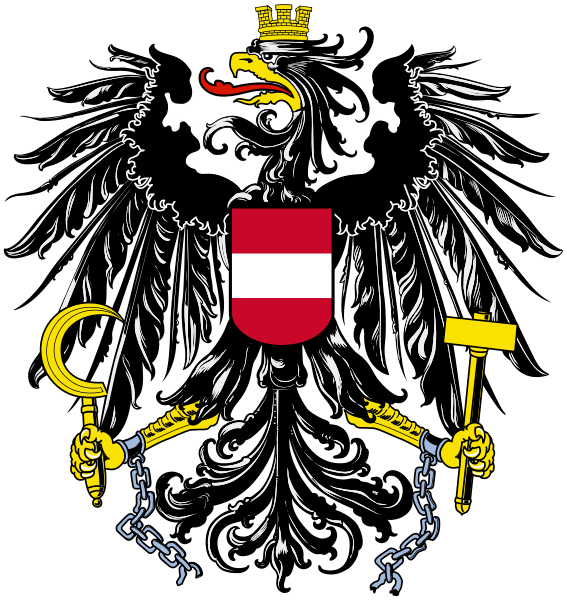- Information
- iGambling
- Blask
- prev
- next
Gambling regulation
-
Online casino:Regulated
-
Online sports betting:Regulated
-
Gambling in detail:
Population
- Population: 8741753 people.
- Official Language: German
- HDI: 0,926
- Salary: $2688
- Poverty rate: 1%
- Gini: 29.8%
- The believing population: 39%
- Main religion: Christianity (80.4%)
- Second religion: Atheism (13.5%)
Harmful habits
- Alcohol: 11.9 litres/year
- Smoking: 26.4%
Internet
- Internet users: 86.1%
- Mobile Internet: 61.2%
- Landline Internet: 36.7%
- Internet speed: 56.6 Mbps
- Country Top Level Domain: .AT
General information about the country
-
Country name:Austria
-
Code (2-digit):AT
-
Continent:Europe
-
Country level:Tier 1
-
Capital:Vienna
-
Country area:83858 sq km.
-
Telephone code:43
-
Currency (code):Euro (EUR)
Geographical features of the country
Administrative division into regions
Federal State (9): Burgenland, Vienna, Upper Austria, Salzburg, Carinthia, Carinthia, Lower Austria, Tyrol, Vorarlberg, Styria.
Features of the country
The modern territory of the country was partially or fully occupied by the following states: Roman Republic, Roman Empire, Frankish State (Frankia), Western Roman Empire, Hunnic Empire, Kingdom of Ostgoths, Samo, Carantania, East Frankish Kingdom, Holy Roman Empire, Austria-Hungary, German Empire.
Austria has access to the following lakes: Lake Constance, Neusiedler See.
The following rivers flow through the territory: Danube, Rhine, Drava, Inn, Mura, Morava, Isar, Ens, Raba, Lech, Die, Lužnice, Ill.
Famous caves in the country: Schonberg, Hirlatz, Dachstein-Mamut, Lamprechtsofen, Kolkbluser-Monster, Eisriesenwelt, Tantalova, Kozanostraloch-Berger-Plateneck, Feuertal, Frauenmauer-Langstein, Burgundershacht, Sonenleitershacht-Heisterjagershacht, Gamslocher-Kolovrat, Alternlabyrinth, E3, Schwer, Barwis, Ariadne, Kamerscharten, Anenschacht and others.
Gambling regulation
-
Online casinos:Regulated
-
Online sports betting:Regulated
Read more about regulation
In Austria, iGaming, online betting, poker and lotteries, as well as offline casinos are legal.
However, online casinos, lotteries and poker are under a state monopoly.
Regulation:
- Online casinos, poker and lotteries are regulated by the Gambling Law (GSpG) and the Ministry of Finance, which oversees licensed companies.
- Sports betting is overseen by 9 federal states, with each state having its own online betting law and local competent regulatory authority.
Regulation of gambling by the state has been repeatedly taken to court by the Austrian Betting and Gambling Association (OVWG) as well as foreign operators.
Most international companies argue that the monopoly in Austria violates EU free market rules because they are licensed elsewhere in the European Union.
However, Austrian courts have consistently upheld the monopoly, citing various public policy constraints, such as the need to reduce gambling addiction.
Top payment systems
Payment Systems (January 2025):
- Bluecode
- EPS
- Klarna
- PostFinance
- Rapid Transfer
- Trustly
Gambling work files
Online Gambling in the country
Population: according to Statistics Austria, as of January 1, 2024, the population was 9,159,993. This means that the number of inhabitants increased by 55,221 or 0.6% compared to the beginning of 2023.
The highest increase was recorded in Vienna and the lowest in Carinthia. Over the year, the share of the number of foreign citizens increased from 19% to 19.7%.
Almost 60% of Austrians live in urban areas.
The average age is 43.4 years. The average life expectancy is 82 years.
At the beginning of 2024, the population had the following age distribution:
- 5.7% - under 4 years old
- 9.7% - from 5 to 12 years old
- 6.1% - from 13 to 17 years old
- 8.4% - 18 to 24 years old
- 14.7% - from 25 to 34 years old
- 14.1% - from 35 to 44 years old
- 12.4% - from 45 to 54 years old
- 11.4% - from 55 to 64 years old
- 17.4% - from 65 and older
Male population - 49.3%, female population - 50.7%.
The literacy rate (ability to read and write) is 98%.
The national composition of the population is quite homogeneous. The main mass consists of German-speaking Austrians - 91.1%, followed by natives of the Balkan countries (Serbs, Croats, Bosnians, Slovenes) - 4%. Another 3.5% are Turks and 1.4% are Germans.
Language: 90% of the country's inhabitants consider German to be their native language. It is also the state language and is used in official documents, on television and radio.
In some regions Croatian, Hungarian, Slovak, Czech and Romani are considered as second official languages.
The study of English is included in the general education program in the country, so about 58-60% of Austrians have enough knowledge to fully communicate in this language.
Religion: Catholics - 73%, atheists - 12%, Protestants - 5%, Muslims - 5%, other religions - 5%.
At the same time church representatives note the decrease in the number of believers for the last 20 years by 15.7%.
Major cities: Vienna (capital), Innsbruck, Graz, Linz, Salzburg.
Currency: since 2002 euro (EUR) became the national currency of Austria.
100 EUR = 103 USD.
Financial opportunities: the number of employed Austrians is 74.8%. 3% of the population is below the poverty line.
The unemployment rate is 8.3%. The unemployment rate among young people is 10.7%. At the same time, 1.3% of Austrians are in long-term unemployment.
The average wage is from $2500, the minimum wage is $1528.
At the same time, unskilled workers receive from $2000 to $2560 per month.
Mentality: historical events of the country (for example, its annexation by the Third Reich during World War II) have influenced the formation of the Austrian mentality.
The typical Austrian can be characterized as open but cautious in dealing with strangers. Austrians are polite, formal and reserved.
At the same time, many residents do not miss the opportunity to closely observe people who interest them. Also, Austrians love news and sensations.
Local people have developed a special ability - the ability to compromise.
The whole country is obsessed with the idea of cleanliness. Austrians are proud to keep their homes in order.
Here, expectations are realistic. Therefore, residents are suspicious of exaggerations, promises that seem too good to be true.
The country belongs to Tier-1. Austria has no external conflicts, stable development of technology, concern for the environment, high level of education and good wages.
Austrians tend to trust the opinion of celebrities and other famous personalities.
Volume of iGaming market: despite the monopoly, the gambling industry remains profitable, providing tax revenues of $740 million in 2023.
State monopoly Casinos Austria generated gross gaming revenue of $1.51 billion in 2023, with the majority of the profit coming from lotteries ($965 million).
Forecasting that the compound annual growth rate (CAGR) of online gambling will be 4.22% until 2029. By then, the volume of this segment could be $793 million.
It is expected that by 2029, online casinos will attract more than 920 thousand users.
Also in the first quarter of 2024, the financial police of the Fraud Office checked almost 15 thousand employees in about 7.1 thousand companies in the fight against tax evasion and social fraud.
This led to almost 2.1k criminal charges with a total fine of over €4.8m. In the area of illegal gambling, fines of almost $750k were imposed.
Internet accessibility: at the beginning of 2024, Austria had 8.58 million internet users and an internet penetration rate of 95.7%.
The average speed of a wireless connection via Wi-Fi is 24.56 Mbps.
The average speed of a mobile internet connection is 16.22 Mbps.
Volume of device usage:
- mobile - 75%
- desktop - 23%
- tablet - 2%
Popular web applications: YouTube, Facebook, Instagram, Snapchat, TikTok.
In January 2024, there are 7.32 million social media users in Austria.
Number of active users at the beginning of 2024:
- YouTube - 7.32 million
- Facebook - 3.5 million
- Instagram - 3.2 million
- Snapchat - 2.33 million
- TikTok - 2.32 million
Player preferences
Austrians pay a lot of attention to casino quality and reputation. They carefully consider the site, gameplay, game catalog, read about the providers.
The main motivation for choosing an online casino is access to novelties, interesting trending slots. Can attract different modes and types of games, live casino.
In addition to slots, roulette and card games are in demand. In Austria, it is the French variety of roulette that is popular. Nevertheless, Austrians also play American and European roulette.
Most residents perceive gambling as an option for recreation and getting bright emotions.
Gambling affiliate programmes that accept traffic from this country
- Blask data from: 06/03/2025
- Population: 8,967,982 people.
- Population growth rate: +0.3% per year.
- Internet users: 8,519,582 people.
-
Urbanization:
Population — 59.5%
Urbanization — 0.68% -
Languages in the country:
German — 88.6%
Other — 5.3%
Turkish — 2.3%
Serbian — 2.2%
Croatian — 1.6%
-
Age structure:
0-14 years — 14.1%
15-64 years — 64.7%
65+ years — 21.2% -
Median age:
Total — 44.9
Male — 43.6
Female — 46.3 -
Literacy:
Total — 99%
Male — 99%
Female — 99%
-
Real GDP:
2021 — $569.376 billion
2022 — $599.427 billion
2023 — $593.703 billion -
Real GDP growth:
2021 — 4.24%
2022 — 5.28%
2023 — -0.95% -
Real GDP per capita:
2021 — $63,600
2022 — $66,300
2023 — $65,000
Blask Index
Top brands in the country
| Brands | BAP* |
|---|---|
| Win2day | 39,2 |
| AdmiraL | 16,8 |
| Bet365 | 9,3 |
| bwin | 9,0 |
| Tipp3 | 6,6 |
- The data for this section was provided by the analytical service Blask.com. Currently, the service's database contains information on 62 countries and more than 2,500 brands. You can view all available countries with Blask statistics at this link.
- Share
- prev
- next















